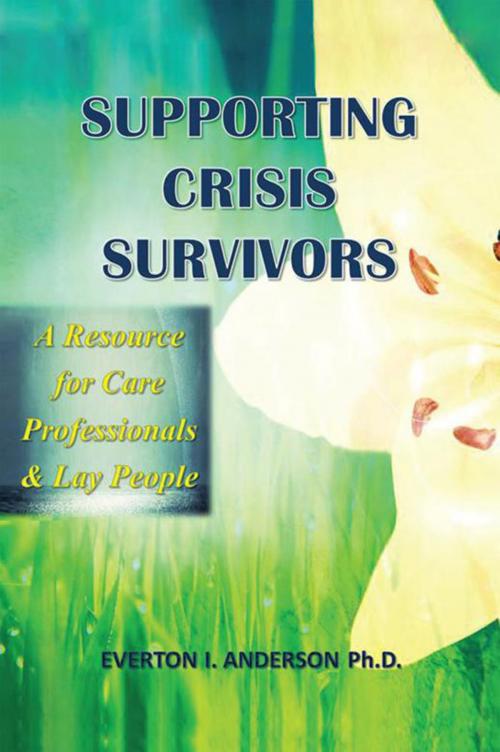Supporting Crisis Survivors
A Resource for Careprofessionals and Lay People
Nonfiction, Health & Well Being, Self Help| Author: | Everton I. Anderson | ISBN: | 9781483656830 |
| Publisher: | Xlibris US | Publication: | July 22, 2013 |
| Imprint: | Xlibris US | Language: | English |
| Author: | Everton I. Anderson |
| ISBN: | 9781483656830 |
| Publisher: | Xlibris US |
| Publication: | July 22, 2013 |
| Imprint: | Xlibris US |
| Language: | English |
CHAPTER ONE CRISIS AND TRAUMAS V PRESENT EVERYWHERE What are the Distinguishing Traits of a Crisis? Research has shown that the Chinese word for crisis involves two characters; one means danger, and the other means opportunity. One psychologist summarized the peculiarities in this manner: A crisis is a turning point that usually cannot be avoided. They are filled with danger because they disrupt life and threaten to overwhelm the people who are affected. Furthermore, a crisis also present people with the opportunity to change, grow, and develop better ways of coping. Since people in crisis often feel confused and helpless, they tend to be more opened to receive outside help, including the help that comes from rescue workers, from counselors and from God. CHAPTER TWO THE MULTIFARIOUS ELEMENTS OF LOSS Increasing Number of Loss Individuals seem to cope with losses better when they are occasional. Yet after the age of 50 or 60, they pass into a period of increasing number of losses. Still grieving from the previous loss, it is ever so hard to make sense of the current one. Furthermore, if one had never learnt to deal effectively or contend with occasional losses, then it is inevitable having several will be catastrophic. Equally important is that each type of loss brings its own kind of suffering and reaction. CHAPTER THREE PURPOSE OF CRISIS COUNSELING When a visit is made, if the crisis counselor does not have an objective, the appointment will be unsuccessful. Therefore, the underlining purpose of crisis counseling is to support the hurting, and not to encourage the avoidance of reality. This means the counselor advises individuals in crisis to admit the crisis, express grief normally and arrive at a healthy resolution. CHAPTER FOUR THE CRISIS OF DEATH AND DYING Although human suffering in multiple dimensions is a factor of life which causes great pain and human anguish, it must not be used as a reason for justifying the direct taking of human lifeKGod must always be understood as the Creator and Sustainer of life. It was Norman St John-Stevas who articulated this view skillfully: The value of human life for the Christian in the first century A. D., as today, rested not on its development of superior sentience but on the unique character of the union of a body and soul, both destined for eternal life. The right to life thus has a philosophical foundation K Respect for the lives of others, because of their eternal destiny is the essence of the Christian teaching. CHAPTER FIVE COMFORTING THE SUCIDAL AND VICTIMS FAMILY The following are invaluable principles that are crucial to the helpline counseling methods: The Suicidal X Activity. The person needs to feel that something is being done for him or her right now. This solemn promise or guarantee can alleviate his or her anxiety. X Involvement of others. If the caller realizes that others are now involved and caring for him or her, the person will be more apt to feel the care and concern and will more likely respond. The Family Counselors, friends and family members alike feel guilt, extreme displeasure, and self-blame because the death was not averted. However, ultimately responsibility for suicide rests with the victim who was unable or unwilling to cope with the pressures of life. Ways to support. Promise to visit the mortuary, and advise family members to do the same. If possible, accompany the grief-stricken relatives, knowing that the initial shock and denial could be overwhelming. X Resist the phrase, It was an accident, a terrible accident. Some may think this is helpful, but its more of an expression of ones own anxiety. X Do not pass judgment, But, he or she was up all night drinking. They did not understand what they were doing. It is not helpful or necessary to give reasons for the suicide. X The date on which the suicide took plac
CHAPTER ONE CRISIS AND TRAUMAS V PRESENT EVERYWHERE What are the Distinguishing Traits of a Crisis? Research has shown that the Chinese word for crisis involves two characters; one means danger, and the other means opportunity. One psychologist summarized the peculiarities in this manner: A crisis is a turning point that usually cannot be avoided. They are filled with danger because they disrupt life and threaten to overwhelm the people who are affected. Furthermore, a crisis also present people with the opportunity to change, grow, and develop better ways of coping. Since people in crisis often feel confused and helpless, they tend to be more opened to receive outside help, including the help that comes from rescue workers, from counselors and from God. CHAPTER TWO THE MULTIFARIOUS ELEMENTS OF LOSS Increasing Number of Loss Individuals seem to cope with losses better when they are occasional. Yet after the age of 50 or 60, they pass into a period of increasing number of losses. Still grieving from the previous loss, it is ever so hard to make sense of the current one. Furthermore, if one had never learnt to deal effectively or contend with occasional losses, then it is inevitable having several will be catastrophic. Equally important is that each type of loss brings its own kind of suffering and reaction. CHAPTER THREE PURPOSE OF CRISIS COUNSELING When a visit is made, if the crisis counselor does not have an objective, the appointment will be unsuccessful. Therefore, the underlining purpose of crisis counseling is to support the hurting, and not to encourage the avoidance of reality. This means the counselor advises individuals in crisis to admit the crisis, express grief normally and arrive at a healthy resolution. CHAPTER FOUR THE CRISIS OF DEATH AND DYING Although human suffering in multiple dimensions is a factor of life which causes great pain and human anguish, it must not be used as a reason for justifying the direct taking of human lifeKGod must always be understood as the Creator and Sustainer of life. It was Norman St John-Stevas who articulated this view skillfully: The value of human life for the Christian in the first century A. D., as today, rested not on its development of superior sentience but on the unique character of the union of a body and soul, both destined for eternal life. The right to life thus has a philosophical foundation K Respect for the lives of others, because of their eternal destiny is the essence of the Christian teaching. CHAPTER FIVE COMFORTING THE SUCIDAL AND VICTIMS FAMILY The following are invaluable principles that are crucial to the helpline counseling methods: The Suicidal X Activity. The person needs to feel that something is being done for him or her right now. This solemn promise or guarantee can alleviate his or her anxiety. X Involvement of others. If the caller realizes that others are now involved and caring for him or her, the person will be more apt to feel the care and concern and will more likely respond. The Family Counselors, friends and family members alike feel guilt, extreme displeasure, and self-blame because the death was not averted. However, ultimately responsibility for suicide rests with the victim who was unable or unwilling to cope with the pressures of life. Ways to support. Promise to visit the mortuary, and advise family members to do the same. If possible, accompany the grief-stricken relatives, knowing that the initial shock and denial could be overwhelming. X Resist the phrase, It was an accident, a terrible accident. Some may think this is helpful, but its more of an expression of ones own anxiety. X Do not pass judgment, But, he or she was up all night drinking. They did not understand what they were doing. It is not helpful or necessary to give reasons for the suicide. X The date on which the suicide took plac















